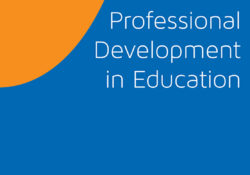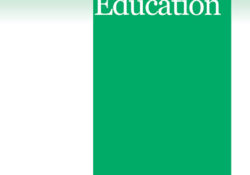tandfonline.com har udgivet en rapport under søgningen “Teacher Education Mathematics”: ABSTRACT ABSTRACT This paper argues that Young and Muller’s ‘powerful knowledge’ requires a more extensive conceptualization of the relation between knowledge and practice. However, rather than focus on the ‘practice turn’ in social theory as Carlgren has suggested, it is argued that what Rouse terms a ‘normative practice’ can help explicate the specialized activities that make powerful knowledge possible. The idea of normative practice provides a basis for the systematic revisability and specialized communities that are said to underpin powerful knowledge, while also illuminating how teachers recontextualise knowledge and reconciling the role of experience with other types of knowledge in a curriculum. Normative practice provides a basis for specialized and ‘knowledgeable’ purposeful practice which suggests that knowledge is never ‘for… Continue Reading →
Like this:
Like Loading...
eric.ed.gov har udgivet: Value-added models measure teacher performance by the test score gains of their students, adjusted for a variety of factors such as the performance of students when they enter the class. The measures are based on desired student outcomes such as math and reading scores, but they have a number of potential drawbacks. One of them is the inconsistency in estimates for the same teacher when value added is measured in a different year, or for different subjects, or for different groups of students. Some of the differences in value added from year to year result from true differences in a teacher’s performance. Differences can also arise from classroom peer effects; the students themselves contribute to the quality of classroom life, and this contribution changes from year to… Continue Reading →
Like this:
Like Loading...
tandfonline.com har udgivet en rapport under søgningen “Teacher Education Mathematics”: ABSTRACT ABSTRACT The COVID-19 pandemic is a historic global event that has extended to all parts of society and shaken the core of what we know and how we live. During this pandemic, the work of STEM professionals has taken center stage. Through our close observations of how the events of the pandemic have been unfolding across the globe, we propose an instructional framework that emerged out of the real-time responses of STEM professionals to explain the pandemic and find solutions. This framework centers on data science, computer science, and multidisciplinary convergence as tools for engaging K-12 students in complex societal problems like the pandemic. In this theoretical position statement, we propose our framework that is grounded in three areas:… Continue Reading →
Like this:
Like Loading...

tandfonline.com har udgivet en rapport under søgningen “Teacher Education Mathematics”: ABSTRACT ABSTRACT Subject marginalisation is an on-going concern across the primary education sector, particularly for the arts and humanities. This poses issues for pre-service teacher partnerships and for higher education institutions (HEIs) evaluating the role of subjects within their teacher training courses as they reform their curricula to prepare students to teach across diverse educational contexts. Through the interpretation of student voice, we disseminate a case study with primary initial teacher education (ITE) students that investigates learner perceptions of their training in under-represented foundation subjects. Emerging themes include tensions between university and school-based practices, and between curriculum models, together with the need to develop student adaptability and self-direction. The authors propose that if ITE students explore and take on the… Continue Reading →
Like this:
Like Loading...
eric.ed.gov har udgivet: With issues of teacher quality in the spotlight, it has been suggested that teachers of mathematics and science too often lack content knowledge in the subjects they teach. Accordingly, research is needed to determine whether teacher ineffectiveness in these subjects is more frequently caused by deficiencies in content knowledge or in pedagogical knowledge, and whether teachers of mathematics and science are more often content-deficient relative to other teachers. Research as such requires that teacher performance be assessed, but this assessment has proven contentious. Use of principals’ evaluations to assess teacher performance, while hardly foolproof, has the advantage of providing school-level managers’ perspective on whether content knowledge or pedagogical knowledge constitutes the more frequent perceived cause of teacher ineffectiveness in secondary schools, especially in mathematics and science. Research… Continue Reading →
Like this:
Like Loading...
tandfonline.com har udgivet en rapport under søgningen “Teacher Education Mathematics”: ABSTRACT ABSTRACT Articulations of effective teacher professional development (PD) consistently foreground a focus on curriculum content and how best to teach it. Consequently, when teachers work together on pedagogy they typically work with colleagues who have similar specialisations, focusing on a specific subject or part of the curriculum. Arguably, however, pedagogical practices cut across grades and subjects, which signals the possibility of effective PD that includes diverse teachers. In this paper, we analyse the impact of a pedagogy-focused approach to PD called Quality Teaching Rounds (QTR), recently tested under randomised controlled trial conditions. Drawing on post-intervention interviews with 96 teachers and leaders at 24 schools in NSW, Australia, we demonstrate that QTR generated fresh insights about pedagogy and students, enhanced… Continue Reading →
Like this:
Like Loading...
eric.ed.gov har udgivet: This paper presents how virtual containers enhance the implementation of STEAM (science, technology, engineering, arts, and math) subjects as Open Educational Resources (OER). The publication initially summarizes the limitations of delivering open rich learning contents and corresponding assignments to students in college level STEAM areas. The role that virtual containers can play in current distant education is then discussed, starting by reviewing related teaching efforts around the use of legacy virtual machines. We then focus on the superseding container technology and how it can bridge the gap between online students, humble computing resources, teachers and IT specificities. As a practical example, we present an experience carried out at the online School of Engineering & Technology at Universidad Internacional de La Rioja (UNIR). Within the context of a… Continue Reading →
Like this:
Like Loading...
tandfonline.com har udgivet en rapport under søgningen “Teacher Education Mathematics”: ABSTRACT ABSTRACT This study examined how teachers relate literacy teaching to their ordinary subject teaching in professional development settings. The study is conducted within the large Swedish professional development program the Literacy Boost (in Swedish “Läslyftet”), which can be viewed as an example of an international focus on reading ability beyond early and beginning reading. Such a focus may be well-grounded, but it also raises concerns of how teachers of different school subjects are addressed in such programs. The findings of this study show that participating teachers express four approaches of relating literacy teaching to subject teaching, indicating different types and degrees of coherence between professional development content and teachers’ teaching practice. While all teaching activities described by teachers aimed… Continue Reading →
Like this:
Like Loading...
tandfonline.com har udgivet en rapport under søgningen “Teacher Education Mathematics”: ABSTRACT ABSTRACT This article aims to analyse how the emerging Swedish school system in the early nineteenth century can be understood within the context of a gradual break-up of the estate society and its replacement with a class society in which citizenship was an important foundation. This is done through the discussion of the conceptions of citizenship on two levels. The first is the national level, focusing the national debate on education, and the second is the local level, investigating the local schools and the school setting. The main result is that the conceptions of citizenship in the school context were formed along two major lines: an inclusive social and civil citizenship and an exclusive, active and political citizenship. Consequently,… Continue Reading →
Like this:
Like Loading...
eric.ed.gov har udgivet: Following a high-quality early care and pre-K experience, the kindergarten-through-third-grade years set the foundation upon which future learning builds; and strengthening this continuum creates opportunities for later success. Key components of a quality experience in K-3 include school readiness and transitions, kindergarten requirements, educator quality, prevention, intervention and assessments, and social and emotional learning and mental health. Education Commission of the States researched the policies and regulations that guide these key components in all 50 states to provide this comprehensive resource and many others. The data in this document show at least 20 states require some form of math knowledge for pre-service teacher candidates. Five additional states only require professional development in math for in-service teachers, with three states having requirements for both teacher candidates and current… Continue Reading →
Like this:
Like Loading...





